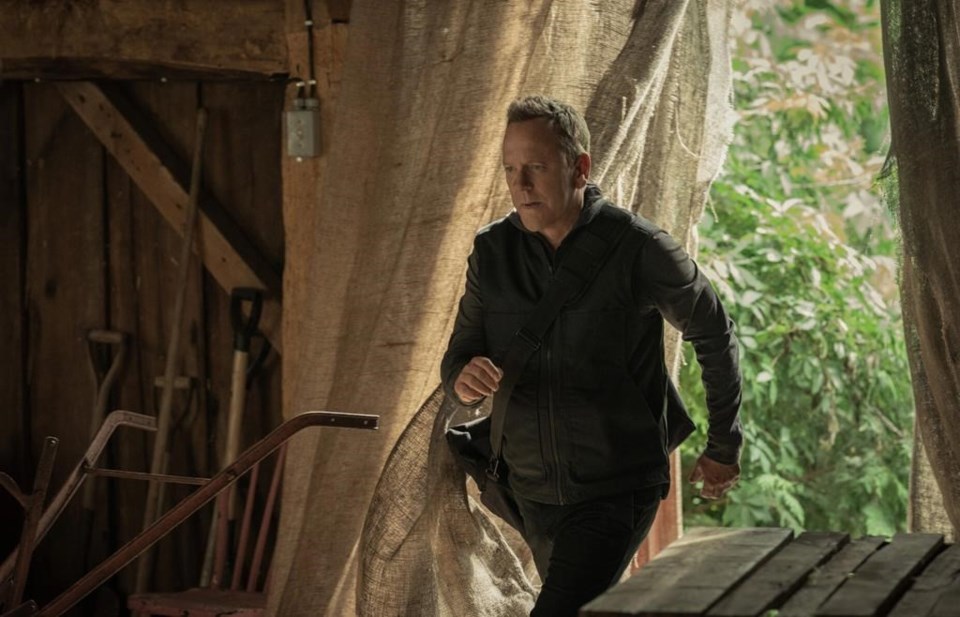Toronto-raised actor Kiefer Sutherland does not spend time, as he puts it, “surfing the web.” He doesn't browse online for news and still visitsa library for research. It’s his recipe, he says, for avoiding misinformation.
“It’s from all sides of the political spectrum,” says the star of a new deception-themed series, “Rabbit Hole,” premiering this Sunday on Paramount Plus.
“There is no circumstance in this universe where two plus two equals five, and yet in an effort to belong to something, people will gravitate to that. I think that this is a potentially very dangerous thing that’s happening in our society.”
Discerning between truth and manipulation has been a signature pattern behind some of Sutherland’s television roles, from the early 2000s as protagonist Jack Bauer in the counterterrorism drama “24,” which ran for nine seasons, to the ABC/Netflix political thriller “Designated Survivor.”
In “Rabbit Hole,” Sutherland adopts a similar path as John Weir, a corporate espionage spy framed for murder by powerful unknown forces with the ability to influence and control populations through technology.
Sutherland is well aware of real-life instances of disinformation spreading online and influencing politics today and sees “Rabbit Hole” as well-placed commentary on the slanted ways those with power package information.
“This technical revolution is something that we’re going to have to adapt to as people and I think it’s really added a bonus for our show to have it as a backdrop,” adds Sutherland. “It shows, in very simple terms, how easy it is to become a victim to someone who really knows how to manipulate your information.”
Sutherland refers to the “world upside down”formulaof the largely Toronto-shot series as being similar to that of time-ticking series “24,” but says that's where the comparisons mostly end.
“I view Jack Bauer, and I say this in the most affectionate way, as kind of a blunt instrument,” says Sutherland when comparing that forceful character's way of handling situations with the less physical Weir.
“This is very different, this is a guy who doesn’t run into a fight, he runs away from a fight; he’s not very good at it to begin with.”
Portraying a less active but still formidable character with Weir, the 56-year-old actor gets to embrace the intelligence and idiosyncrasies of a spy with a sense of humour.
Weir is someone who prefers to avoid contact, such as perpetrating a bomb threat to enter a government building, compared to the physical solutions of a Bauer — a direction Sutherland is thankful for.
“When someone asked me, what’s the secret (to shooting a scene) when a guy walks up and takes a skateboard and smacks you in the back of the head, I said, the only secret is that you try not to do it twice,” jokes Sutherland in reference to a wind-knocking scene involving Weir and a younger assailant.
“You can do the best to stay in shape, but there’s a big difference between 30 and 50, and it’s an adjustment you can either kind of lean into and make fun, or don’t, but yeah, it’s been different.”
Sutherland accepts that he can’t be an action star in the exact form of years past, and he doesn’t force the possibility — he never has.
“It’s so funny, because the older you get, the more you have to look back on,” says Sutherland, who recalls his early career walks down Queen Street in Toronto where the premiere of his major film role, “The Bay Boy,” was shown.
He portrayed the central character in the Genie Award-winning 1984 drama directed by Daniel Petrie about a teenage boy living in a mining community on Cape Breton, N.S., in the 1930s who witnesses a murder.
The Hollywood career that would follow would include the coming-of-age classic "Stand by Me"; a starring role opposite Forest Whitaker and Ray Liotta in the 1992 drama comedy “Article 99”; and a part in the legal drama “A Few Good Men" starring Tom Cruise and Jack Nicholson.
In the 2000s, the prolific actor's portfolio includes roles in Lars von Trier’s “Melancholia,” and “Forsaken,” a western opposite his father, Donald Sutherland.
“As I look back on it, it looks like there might have been some real thought put into the career, but the truth is, I was just trying to pay my bills. I had kids at a very early age and I loved what I was doing," he says.
“I just got really lucky and some of the films worked out far better than I could have ever imagined, and that kept me going.”
This report by The Canadian Press was first published March 23, 2023.
Noel Ransome, The Canadian Press



